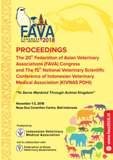MP-13 Antibody Response to Avian Influenza Vaccination in Small-Scale Duck Farming in Mojokerto District, East Java
Abstract
Commercial duck farming in Indonesia is practiced either as a nomadic way (moving around) or as an intensified settled system. Since the emergence of Highly Pathogenic Avian Influenza (HPAI) H5N1 subtype clade 2.1.3 in Indonesia in 2003, ducks acted as a reservoir (carrier) without showing clinical signs. In late 2012 the new HPAI H5N1 clade 2.3.2 was introduced which caused high duck mortality, especially in young ducks. Nomadic ducks have a high risk of developing and spreading Avian Influenza (AI). In addition to this high risk, there are many duck farmers who do not practice proper AI vaccination, to achieve protective immunity. One of the measures to control AI is by administering scheduled vaccinations. The objective of this study was to investigate the increase of AI antibody titer in ducks after vaccination and to identify the best timing for vaccination.

